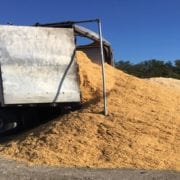Be Aware – Seven stores pay fines for price-scanning errors
The N.C. Department of Agriculture and Consumer Services’ Standards Division has collected fines from stores in Chatham, Columbus, Guilford, Mecklenburg, Moore, Pender and Wake counties because of excessive price-scanner errors.
“As we get into the holiday season, we want consumers to be confident that the price on the shelf matches the price at the register,” said Agriculture Commissioner Steve Troxler. “Stores have a responsibility to make sure their pricing is accurate, and most stores pass inspection. Ones that don’t are fined until they come into compliance. Consumers who would like to file a complaint about a store can call the Standards Division at 919-707-3225.”
The department conducts periodic, unannounced inspections of a business’ price-scanner system to check for accuracy between the prices advertised and the prices that ring up at the register. If a store has more than a 2 percent error rate on overcharges, inspectors discuss the findings with the store manager and conduct a more intensive follow-up inspection at a later date. Undercharges are also reported, but do not count against a store.
Penalties are assessed if a store fails the follow-up inspection. In addition to the penalties paid, the store will be subject to re-inspection every 60 days from the last inspection until it meets the 2-percent-or-less error rate. Additional penalties may be assessed if the store fails a re-inspection.
Following are stores that paid civil penalties in the third quarter of 2016:
- Wal-Mart #3182 at 12500 U.S. 15/501, Chapel Hill, paid $1,995 in civil penalties. An initial inspection in April found an error rate of 5 percent, based on five overcharges in a 100-item lot. A second inspection in June found an error rate of 3.33 percent, based on 10 overcharges in a 300-item lot. The store passed inspection in September with a 1.33 percent error rate.
- Family Dollar #71 at 1001 Pireway Road, Tabor City, paid $1,005 in civil penalties. An initial inspection in May found an error rate of 10 percent, based on five overcharges in a 50-item lot. A second inspection in June found an error rate of 2.33 percent, based on 7 overcharges in a 300-item lot. The store passed inspection in August with a .33 percent error rate.
- Family Dollar #3937 at 2316 E Market St., Greensboro, paid $5,555 in civil penalties. An initial inspection in May found an error rate of 10 percent, based on five overcharges in a 50-item lot. A second inspection in June found an error rate of 5.33 percent, based on 16 overcharges in a 300-item lot. The store paid $2,970 in civil penalties. A third inspection in August found an error rate of 6.33 percent, based on 19 overcharges in a 300-item lot. The store paid an additional $2,585 in penalties and will be re-inspected.
- CVS #7688 at 3440 Wilkinson Blvd., Charlotte, paid $1,940 in civil penalties. An initial inspection in April found an error rate of 8 percent, based on four overcharges in a 50-item lot. A second inspection in May found an error rate of 4 percent, based on 12 overcharges in a 300-item lot. The store paid $705 in penalties. A third inspection in July found an error rate of 3.67 percent, based on 11 overcharges in a 300-item lot. The store paid $1,235 in penalties. The store passed inspection in September with a 1 percent error rate.
- Dollar General #7052 at 3350 U.S. 1, Vass, paid $517 in civil penalties. An initial inspection in April found an error rate of 10 percent, based on five overcharges in a 50-item lot. A second inspection in May found a 2.67 percent error rate, based on 8 overcharges in a 300-item lot. The store passed inspection in July with a 2 percent error rate.
- Dollar General #9201 at 15489 U.S. 17 North, Hampstead, paid $2,247 in civil penalties. An initial inspection in May found an error rate of 8 percent, based on four overcharges in a 50-item lot. A second inspection in June found an error rate of 2.33 percent, based on seven overcharges in a 300-item lot. The store paid $397 in penalties. A third inspection in August found an error rate of 4 percent, based on 12 overcharges in a 300-item lot. The store paid $1,850 in penalties and will be re-inspected.
- Family Dollar #3594 at 3416 Poole Road, Raleigh, paid $5,940 in civil penalties. An initial inspection in March found an error rate of 8 percent, based on four overcharges in a 50-item lot. A second inspection in April found an error rate of 3.33 percent, based on 10 overcharges in a 300-item lot. The store paid $1,290 in penalties. A third inspection in June found an error rate of 4 percent, based on 12 overcharges in a 300-item lot. The store paid $1,865 in civil penalties. A fourth inspection in August found an error rate of 4.67 percent, based on 14 overcharges in a 300-item lot. The store paid $2,785 in penalties and will be re-inspected.




